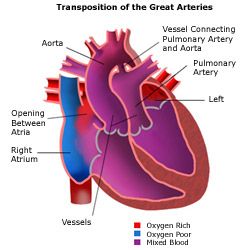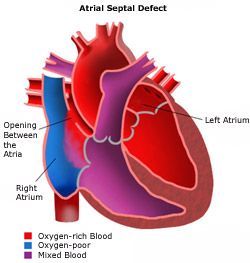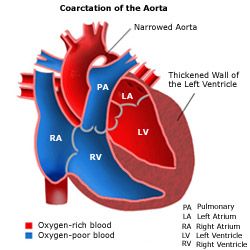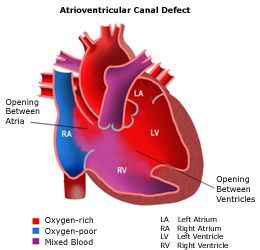Weill Cornell offers the most advanced surgical therapy for congenital heart disease for pediatric patients of all ages, from newborns to adolescents. The conditions that we treat most often in the various age groups include:

Transposition of the great arteries results from a switch in the anatomical positions of the pulmonary artery and aorta such that the aorta arises from the right ventricle and the pulmonary artery arises from the left ventricle. This anomaly causes oxygen-poor blood to be circulated to the body instead of oxygen-rich blood, a life-threatening medical emergency requiring immediate treatment.
Our world-renowned surgeons have pioneered the innovative arterial switch procedure which re-establishes normal anatomy and function while seeking to avoid the complications that have been associated with other surgical approaches. We have performed more than 400 arterial switch procedures since 1990.
Hypoplastic left heart syndrome (HLHS) is caused by an incompletely formed left side of the heart. We have extensive experience with the Norwood procedure and stage palliation for HLHS. Our outcomes rank among the best in the country for this type of repair, and we are currently involved in a major multi-institutional study evaluating this and other innovative procedures for the treatment of HLHS.
Tetralogy of Fallot, in which the heart delivers less oxygen to the body than normal, is the most common cyanotic defect. This complex congenital condition consists of four developmental defects that require surgical correction early in childhood.
Ventricular septal defect is an opening in the wall that separates the two ventricles of the heart, causes mixing of oxygen-poor blood with oxygen-rich blood.
 Ventricular Septal Defects
Ventricular Septal DefectsAtrial septal defect, an opening in the wall between the right and left atria, results in abnormal blood flow through the heart. Left untreated, this condition can cause enlargement of the right side of the heart, arrhythmias and, in some cases, pulmonary hypertension.

Coarctation of the aorta, a constriction in the aorta, causes blood pressure to increase above the narrowed area while limiting blood flow to the body.

Atrioventricular canals are large openings between the right and left sides of the heart. Usually, one large common valve replaces the normal mitral and tricuspid valves. Left untreated, this defect can cause the poor growth, malnourishment, enlargement of the heart, and even pulmonary hypertension.
Single ventricle is a collective term that describes defects in which oxygen-rich and -poor blood is mixed in a single ventricle. Our pediatric cardiac surgeons have expertise in the Fontan procedure, which directs oxygen-poor blood directly to the pulmonary artery and lungs. The single ventricle is reserved for collecting oxygen-rich blood from the lungs, then pumping it to the aorta and the rest of the body.
Valve repair, is performed for damaged mitral, tricuspid or aortic valves.
Abnormal mitral, tricuspid, or aortic valves receive expert surgical treatment.
Failing Fontan surgery requires special expertise of our Weill Cornell team so that problems resulting from previous surgeries can be resolved.
At Weill Cornell, we also provide highly specialized cardiology and cardiac surgery care for adults with congenital heart disease whose needs require the special expertise of physicians who are trained in both pediatric and adult heart disease and their treatment.